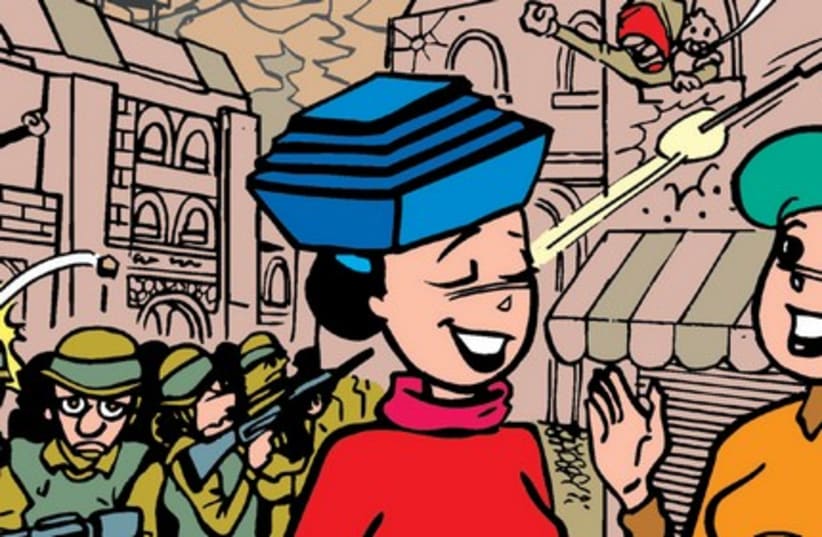Who or what inspires your drawing? “Asterix is a huge inspiration, as was MAD Magazine. Of course, I love all of the superheroes, which led me to create Israel’s first superhero, Sabraman. I would have to say Batman is by far my favorite superhero – he doesn’t have super powers, he’s just a clever guy who does amazing stuff, and is the number two superhero after Superman. I like that.”
How big is the comic industry in Israel? “It’s not huge, but it is growing.The issue is that comics here are either not taken seriously enough, seen as “kids drawings” or jokes, or they are taken way too seriously by crazy fanboys and pretentious academics who don’t have the best grip on reality. I think comics are best understood in France, where they are seen as a legitimate form of expression . Having said that, the fact that Israel now has a ComicCon (Comics Convention, held at the Tel Aviv Cinemathteque) is just huge. I think that the industry here is only going up, not down.”Zbeng is the quintessential Israeli comic; everyone has read it at some point in their lives and everyone can relate to it. From what or whom do you continue to draw inspiration for the comic? “I started drawing Zbeng when I was a student and needed to draw to make money to eat. At that time, Ma’ariv Le’Noar (a popular Israeli teen magazine where Zbeng was and is still published) was very popular and I created a bunch of everyday characters in the strip, caricatures of Israeli youth, and it just worked. It was easy then and is still very easy to draw, because I just draw what I see around me everyday. I try to keep it modern, which is very easy because everything today is about youth culture and about being accessible. I think I would struggle more to do a strip about senior citizens.”Fink is a small anthology of a number of your short strips. How well was it received? “Fink was drawn with the purpose of being for export; it was never intended for an Israeli audience but written in English for export around the world. Generally, the feedback from it was very good but the circulation was pretty small. There is a particular market for that, for Israeli comics in English. Though I mostly received good feedback, some people thought it could have been more left wing, more provocative or that it was too provocative. Other people were a little shocked that I said some of the things that I did; I think they were surprised about the high level of freedom of speech in this country.In France it was very well received and earned me a book deal there. I published my first graphic novel in France in 2008.”Sabraman, your Israeli superhero, fights off the Nazis. If you could do a different version today, would you draw it based on current events, say, against Ahmadinejad? “That could be a lot of fun and pretty funny. Actually, I suppose I would do something worse than that, like digging into Ahmadinejad’s past and finding out he’s actually Jewish and making him a settler or something. You know, I have to have fun too.”What are you working on now? “I’m working on a series which loosely translated into English would be called The Authority, which will see a bit of an Israeli superhero “revival” of sorts. I have my monthly Zbeng magazine and I do a lot of translation for French comics. Of course, I have my daily strip on mako.co.il, which is really my favorite kind of work. I love daily strips; they are always the best, the most fresh and the most fun to create. I actually think daily strips are works of genius – to be able to come up with fresh material, both jokes and illustrations in four panels, is quite an art form.”
Finally, what words of wisdom would you like to impart upon all of the aspiring comic artists out there? “Draw. Just draw lots! Draw what you like, what you don’t like, everything. Try lots of different things, because doing a bit of everything will help you to find what your creative center is. This isn’t something you can necessarily learn anywhere; you just have to keep drawing the stories around you. Watch films and read as well, to understand the art of storytelling, but most importantly, draw.”
